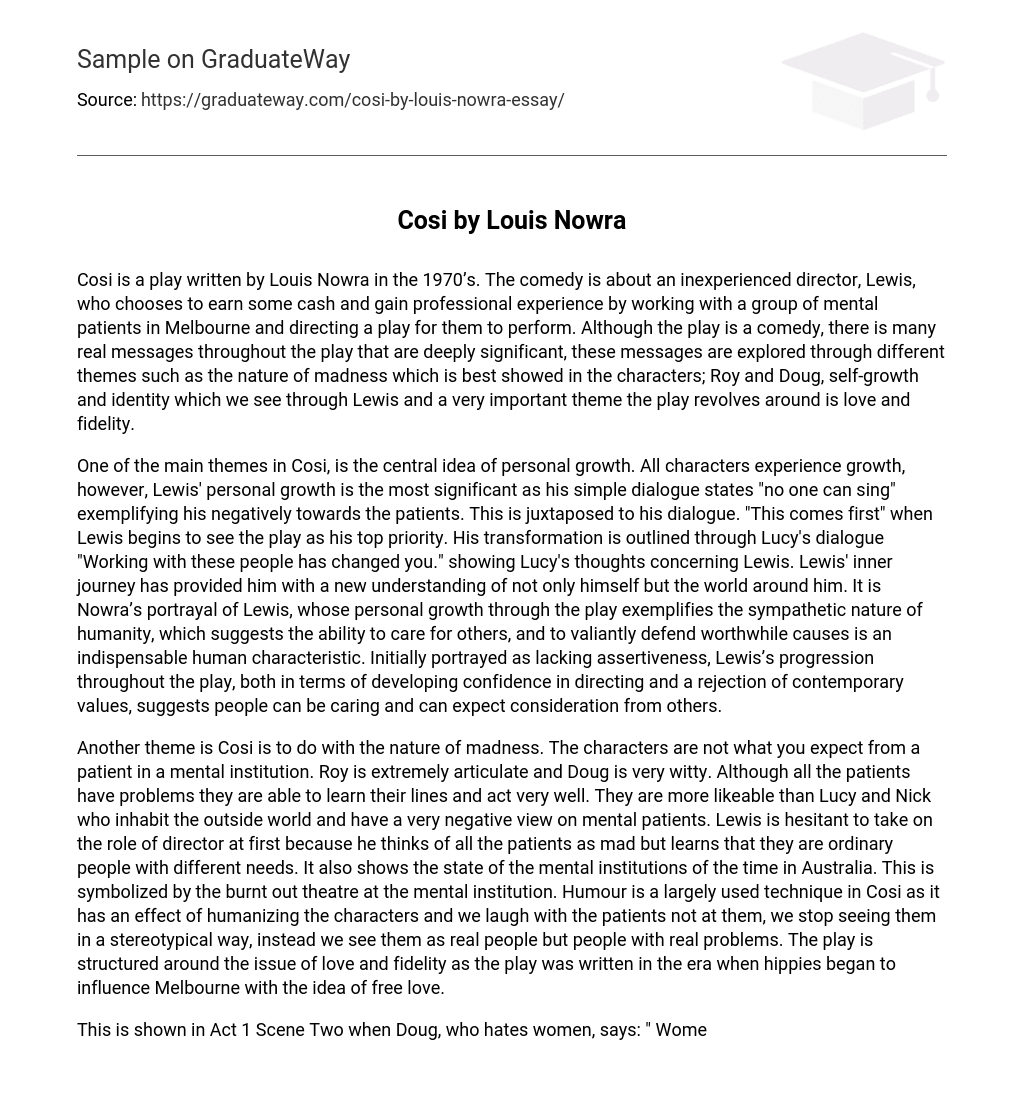Cosi is a play by Louis Nowra in the 1970’s. It tells the story of an inexperienced director named Lewis, who chooses to work with a group of mental patients in Melbourne. His goal is to earn money and gain professional experience by directing a play for them. Although the play is a comedy, it carries deep and meaningful messages. These messages are explored through various themes, such as the nature of madness, depicted through characters like Roy and Doug; self-growth and identity, represented by Lewis; and the significant theme of love and fidelity that the play revolves around.
The central theme of personal growth is one of the main ideas explored in Cosi. All characters in the play go through some form of growth, but it is Lewis’ personal growth that stands out the most. At the beginning, Lewis expresses his negative opinion towards the patients by stating “no one can sing”. However, as the play progresses, Lewis starts to prioritize the play and says, “This comes first”. Lucy acknowledges Lewis’ transformation by saying, “Working with these people has changed you.” Through his journey, Lewis not only gains a better understanding of himself but also of the world around him. Nowra portrays Lewis as someone whose personal growth showcases the compassionate nature of humanity and highlights the importance of caring for others and defending worthwhile causes. Initially lacking assertiveness, Lewis develops confidence in directing and rejects contemporary values, thus demonstrating that people can be caring and expect consideration from others.
Another theme explored in Cosi is the nature of madness. Contrary to what one might expect from patients in a mental institution, the characters in the play are surprisingly articulate and witty. Despite their individual problems, they are able to memorize their lines and deliver outstanding performances. In fact, they are even more likable than Lucy and Nick, who reside in the outside world and hold a negative perception of mental patients. Initially hesitant to take on the role of director, Lewis gradually realizes that these patients are ordinary individuals with unique needs, as opposed to being solely “mad.” The play also sheds light on the state of mental institutions in Australia during that time period, symbolized by a burnt out theatre within the institution. Humor plays a significant role in Cosi, effectively humanizing the characters. Rather than laughing at them, we laugh with them and witness them as real people facing genuine challenges. The play’s structure focuses on the themes of love and fidelity, reflective of the era when hippie ideology began influencing Melbourne with the concept of free love.
The excerpt from the play “Cosi Fan Tutte” highlights the theme of free love and its impact on relationships. In Act 1 Scene Two, Doug, who holds a negative view towards women, expresses that they are simply more discreet when it comes to engaging in extramarital affairs. This notion challenges traditional ideas of faithfulness and commitment. Lucy, Lewis’ girlfriend, supports the concept of free love while Lewis does not. This fundamental difference in their beliefs leads to the downfall of their relationship. Lucy argues that their lack of marital status justifies her involvement with Lewis’ friend Nick and engaging in sexual relationships with Lewis himself. The play delves deeply into the notions of love and fidelity, as each character holds contrasting views and opinions on these matters.
Overall, the play conveys the message that individuals with mental illness are essentially regular people with unique requirements. It challenges the assumption that those who are deemed “sane” are the ones who truly need assistance. Through Lewis’ experience of spending time with the so-called “insane” individuals, Nowra illustrates how empathy towards them becomes his main focus. Furthermore, the humor employed throughout the play enhances the audience’s connection to the characters.





